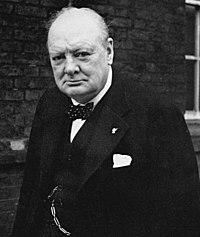Winston Churchill Biography
Winston Churchill
( Redirected to Winston Churchill )
Winston Churchill ( November 30 , 1874 - January 24 , 1965 ) English politician World War II , L940- L945 time England was the prime minister. Churchill was a well-known diplomat and intense speaker. He had been an officer in the army, he was also a historian, writer and artist. He was the only Prime Minister who was awarded the Nobel Prize.
During his army career, Churchill showed his jaw in India , Sudan and World War II . He got fame as a war correspondent. During World War I , he took a vital responsibility in the British army. As a politician, he worked on several positions. Before World War I, he was the President of the Board of Trade in the Ministry of Home Affairs. During World War I, he remained Lord of Admiralty. After the war, he was made the minister of arms stores. On 10 May 1940 he was made the Prime Minister of the United Kingdom and he won the fight against the fiercest nations. Churchill was an intense speaker.
Sequence
Introduction [ edit ]
Churchill was born on 30 November 1874 at the Blenheim Palace of Oxford Shire. Her father was Lord Randolph Churchill, mother Jenny was the daughter of Leonard Jairam of New York City. His education took place in Harry and Sennherst. In 1895, he joined the army and participated in the war of liberation in 1897 and in the war of liberation in 1898. These warriors provided enough material to him for two books - The Story of Ownland Field Force (1898) and The River War (1899). During the war of South Africa (1899-1902), he was working as a correspondent of the Morning Post. They were detained there, but escaped. He mentions his experiences in 'London to Ladymother via Pretoria' (1900).
In 1900, the Senate was elected from the Oldham constituency. Here he used to speak after a lot of preparations. Hence, in the art of debate, he became a master. He had much knowledge of his father's political memoirs. Therefore, in 1906, he was named Life of Lord Rewaldolf Churchill Written in English as one of the most interesting political biographies of English. In 1904, dissatisfied with the business dealer of Chamberlain, he joined the Churchill Liberal Party and was appointed to the colonies of the Campbell Bannerman (1905-1908). In 1908 he joined the Cabinet as the Chairman of the Board of Trade. He remained a Home Secretary from 1909 to 11 Being unable to deal with industrial nuisances, he was appointed the President of the Jalsaena. In this post, he worked with great passion and foresight and this is the reason that when the war started in 1914, the British Sena was fully equipped. TheyWere supporters of the declaration of war against Germany . When the Liberal Government collapsed, they entered politics in abandonment war zone. In 1917, under the leadership of Lloyd George, he became the Minister of War and Transport. Lloyd George did not get too long, and in 1922 he was not even elected.
In 1924, he was elected to the Parliament from Eping, and Stanley Baldwin invited him to rejoin the Conservative party. In 1929, Baldwin got a difference in India's relations. Churchill did not want any surrender of British-empire-power in India. He remained out of the Cabinet for 9 years. But being a parliamentarian and influential leader, he continued to clarify his views on public questions. He openly oppose Hitler's policy of compromise. The Munich Agreement is called the defeat of the war without They wanted to prepare England for war and for that reason the Soviet Union immediately understood the compromise necessary. The Prime Minister Chamberlain rejected both of his suggestions.
When the UK announced Yutra on September 3, 1939, Churchill was appointed the Chief of the Air Staff. The defeat of Norway in May, 1940 caused the British public to believe in the Chamberlain. On 10 May the Chamberlain gave the paperwork and Churchill took over as Prime Minister and created a joint national government. Speaking in the Lok Sabha three days later, he said that 'I can not provide any more than blood, labor, tears and sweat. He had unwavering faith in the battlefield, who was inspired by the crisis. The combined power of the British Empire, not only but the forces of America and Russia, actively inspired against the Germans.
Allied conquests due to their relentless hard work, faith, perseverance and passion. This victory generated new problems for them. They were accused of supporting the alleged reactionary governments of Belgium, Italy, and Greece, as well as the Soviet Union became indecisive in respect to Eastern Europe. In 1945, the celebration of the victory of the war was celebrated, but in the public elections of that year Churchill's party was defeated and they had to accept the post of anti-Lieutenant. The public knew that they could lead the war situation. The necessity was not to build but to build after the war. In the year 1945-50, he was also busy writing his history of the Second World War along with his parliamentary responsibilities. He wrote this in six volumes. Nobel Prize for Literature in 1953to be provided. In the public election of 1950, the number of members of his party increased, and the majority of Shramdalas left only seven members. His party won the elections in October, 1951 and he was again appointed Prime Minister. He was persistent towards world peace, he wrote a great history of English language speakers from his specific perspective. Due to old age and ill health, he resigned from the post of Prime Minister on April 5, 1955 and thus retired from politics.







No comments